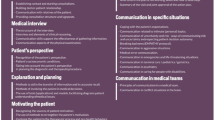Abstract
Background
Communication proficiency is essential in medicine, and English is an important communication tool. Teaching, learning, and developing communicative competence in English are becoming a prominent part of educational programs at medical schools all across Japan.
Aim
This study aimed to assess the effects of a medical English course (MEC) on communicative competence in young doctors.
Methods
Japanese graduate students in the doctoral program at the Hokkaido University Graduate School of Medicine attended a compulsory MEC for at least 1 year. Students’ self-confidence scores in performing various communicative tasks, either in English or Japanese, were rated using visual analogue scales (VAS) at the beginning and end of the MEC. Other graduate medical students enrolled in the same doctoral program, but who did not attend the MEC, participated as the control group.
Results
Thirty-one students joined the MEC. Statistically significant improvements were observed in the students’ self-confidence in performing the evaluated communicative tasks following participation in the MEC. No improvements were observed in the control group.
Conclusion
The results from this study suggest that the inclusion of this MEC in graduate medical education helped the students to communicate more effectively and may contribute to the enhancement of young doctors’ self-confidence levels for communicative competence.




Similar content being viewed by others
References
Wulff HR. The language of medicine. J R Soc Med. 2004;97:187–8.
Meneghini R, Packer AL. Is there science beyond English? Initiatives to increase the quality and visibility of non-English publications might help to break down language barriers in scientific communication. EMBO Rep. 2007;8:112–6. doi:10.1038/sj.embor.7400906.
Uemura K. Medical English education in Japan: past, present and future. Journal of Medical English education. 2009;8:7–11.
Walley S, Bailey JR, Albadri S, Mackie IC, Gilchrist F, Rodd HD. Undergraduates’ self-reported clinical experience, confidence and perspectives of hospital and outreach paediatric dentistry: a three-year multi-centre evaluation. Br Dent J. 2014;216:251–6. doi:10.1038/sj.bdj.2014.144.
Funke F, Reips UD. Why semantic differentials in Web-based research should be made from visual analogue scales and not from 5-point scales. Field Methods. 2012;24:310–27.
Taran S. An examination of the factors contributing to poor communication outside the physician-patient sphere. Mcgill J Med. 2011;13:86.
McKillop J, Simpson J, Evans P, Ellaway R, Cameron H, Cumming A, Gibbs T, Guild S, Harden RM, McKenzie H, Mires G, Morrison J, Pippard M. The Scottish doctor. Learning outcomes for the medical undergraduate in Scotland. A foundation for competent and reflective practitioner. 3rd ed. Dundee: Association for Medical Education in Europe (AMEE); 2008. p. 1–35.
Aspegren K. BEME Guide No. 2: teaching and learning communication skills in medicine—a review with quality grading of articles. Medical Teacher. 1999;21:563–70.
Gould D, Kelly D, Goldstone L, Gammon J. Examining the validity of pressure ulcer risk assessment scales: developing and using illustrated patient simulations to collect the data information point: visual analogue scale. J Clin Nurs. 2001;10:697–706.
Acknowledgements
The authors would like to acknowledge all the participants in this study for dedicating their time to complete the questionnaires. This study was funded by the Japan Society for the Promotion of Science Grant-in-Aid for scientific research (KAKENHI-C, project number 25350221, principal investigator number 10636939).
Author information
Authors and Affiliations
Corresponding author
Ethics declarations
The study was approved by the Hokkaido University Ethics Committee.
Conflict of Interest
The authors declare that they have no conflicts of interest.
Rights and permissions
About this article
Cite this article
Amengual, O., Oku, K., Murakami, M. et al. Effectiveness of a Medical English Course on Communication Abilities of Graduate Medical Students. Med.Sci.Educ. 27, 209–216 (2017). https://doi.org/10.1007/s40670-017-0372-x
Published:
Issue Date:
DOI: https://doi.org/10.1007/s40670-017-0372-x




